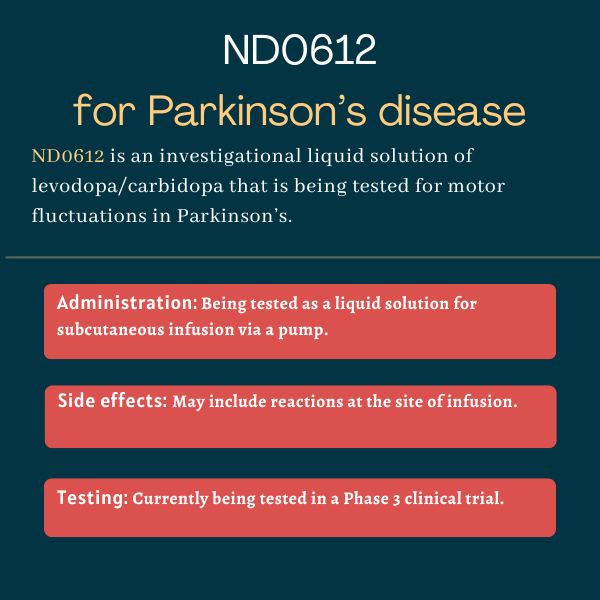ND0612 for Parkinson’s disease
Last updated June 26, 2024, by Margarida Maia, PhD

What is ND0612 for Parkinson’s disease?
ND0612 is an investigational liquid formulation of levodopa/carbidopa being developed to treat motor fluctuations in people with Parkinson’s disease.
NeuroDerm, a subsidiary of Mitsubishi Tanabe Pharma Corp., is developing the therapy, to be administered as an infusion under the skin, or subcutaneously, using a pump.
The company submitted a New Drug Application (NDA) to the U.S. Food and Drug Administration (FDA), who rejected its application in a complete response letter in June 2024.
Mitsubishi Tanabe Pharma is addressing the FDA’s comments to decide future steps.
Therapy snapshot
| Treatment name: | ND0612 |
| Administration: | Being tested as a liquid solution for continuous subcutaneous infusion |
| Clinical testing: | Currently being tested in a Phase 3 clinical trial; regulatory decision pending |
How does ND0612 work?
Parkinson’s disease is a neurodegenerative disorder characterized by the progressive degeneration and loss of dopamine-producing nerve cells (dopaminergic neurons) in the brain.
Dopamine is a signaling chemical involved in the control of voluntary movements. As the amount of dopamine in the brain decreases, people with Parkinson’s begin to have motor symptoms, which include bradykinesia (slowed movements), rigidity, tremor, and balance issues, along with nonmotor symptoms.
Levodopa, the gold standard treatment for Parkinson’s, contains a molecule that cells can use to make dopamine. It is often given in combination with carbidopa, which works to prevent the breakdown of levodopa by enzymes called decarboxylases outside the nervous system. This lets more levodopa get into the brain, where it’s needed to ease motor symptoms.
As Parkinson’s progresses, patients being treated with levodopa may have motor fluctuations, also called on-off times. These fluctuations occur when the levodopa’s effectiveness diminishes toward the end of a dosing interval.
On time refers to periods when levodopa is effectively managing the symptoms and providing patients with relief. Off time refers to periods when the therapeutic benefits of levodopa diminish, allowing motor symptoms to resurface until the next dose takes effect.
Currently, the majority of available levodopa/carbidopa formulations are taken by mouth and need to travel the gastrointestinal (digestive) tract before they can be absorbed into the bloodstream. Many patients have gastrointestinal problems as nonmotor symptoms of Parkinson’s worsen, however, which can limit the amount of levodopa that’s absorbed and taken up by the blood and gets into the brain.
ND0612 pumps a continuous, round-the-clock supply of the two medications as an infusion under the skin. Because it bypasses the gastrointestinal tract, ND0612 results in stable and sustained levels of levodopa in the blood, preventing it from reaching the lowest levels associated with off time in Parkinson’s. This should provide sustained relief of motor fluctuations for people with Parkinson’s disease.
How will ND0612 be administered in Parkinson’s disease?
ND0612 is a liquid solution delivered continuously under the skin via a wearable patch pump system. In clinical trials with Parkinson’s patients, ND0612 has been given at a total daily dose of 538 mg/68 mg or 720 mg/90 mg of levodopa/carbidopa up to 24 hours a day.
ND0612 in Parkinson’s clinical trials
ND0612’s safety and tolerability were initially tested in a Phase 1 study (NCT01486628) in 36 healthy volunteers, a Phase 1/2a study (NCT01725802) in eight Parkinson’s patients with moderate disease, and in a Phase 2a trial (NCT01883505) in 30 Parkinson’s patients who had motor complications.
Results from the latter study showed the delivery of ND0612L under the skin was safe and tolerable, and resulted in less fluctuations in plasma levodopa concentrations when given to Parkinson’s patients as an add-on treatment to oral levodopa.
NeuroDerm also designed a Phase 2a trial (NCT02577523) to test the efficacy, safety, tolerability, and pharmacokinetics (the movement into, through, and out of the body) of two ND0612 dosing regimens. The study enrolled 38 participants with advanced Parkinson’s who were randomized to receive either 24-hour or 14-hour infusions for 28 days.
Results showed a significant reduction in off time and increase in on time without troublesome dyskinesia, that is, uncontrolled movements that may occur with long-term use of levodopa, over the beginning of the study. On time with moderate to severe dyskinesia also decreased. Patients in the 24-hour group saw a larger reduction in off time compared to the 14-hour group, with 42% of patients in the 24-hour group seeing complete resolution of off time.
NeuroDerm then launched a Phase 2 clinical trial called BeyoND (NCT02726386) before moving on to Phase 3 clinical testing with BouNDless (NCT04006210).
BeyoND clinical trial
This open-label Phase 2 study tested the safety and tolerability of ND0612 in people with advanced Parkinson’s, ages 30 and older, who were having motor fluctuations.
Patients received ND0612, either as a 16-or 24-hour infusion, for a year.
The most common side effects were reactions at the site of infusion, which were mostly mild to moderate.
Of the 120 patients who completed the first year of treatment, 114 (95%) rolled over into a long-term extension where they could continue to receive ND0612 for about 8.3 years. After 4.6 years, 64 patients remained in the clinical trial.
Over the entire treatment duration, more than two-thirds (73%) of patients had at least one side effect. Most were reactions at the site of infusion, such as lumps, pain, hematoma (severe bruising), and eschar, which is dry, dead tissue with a leather-like appearance. There were no differences in safety between the 16-and 24-hour regimens.
BouNDless clinical trial
In this Phase 3 clinical trial, NeuroDerm tested how well ND0612 worked versus oral immediate-release levodopa/carbidopa in 259 people with Parkinson’s who were having motor fluctuations.
After an open-label run-in phase to establish the optimal dosing that lasted no longer than 12 weeks, about three months, the patients were randomly assigned to receive the previously optimized regimen of either subcutaneous ND0612 (plus an oral placebo) or oral levodopa/carbidopa (plus a subcutaneous placebo) for 12 weeks.
The main goal was to assess changes in mean on time without troublesome dyskinesia. Based on daily logs kept by the patients, ND0612 extended the average daily on time without troublesome dyskinesia by 2.2 hours compared with 0.48 hours with oral levodopa/carbidopa.
ND0612 also significantly reduced daily off time by an additional 1.4 hours and outperformed oral levodopa/carbidopa in easing motor symptoms that interfere with activities of daily life.

Common side effects of ND0612
The most common side effects reported with ND0612 during clinical testing were reactions at the site of infusion, including:
- lumps
- pain
- infection
- hematoma (severe bruising)
- eschar (dry, dead tissue)
- cellulitis
- abscess
- ulcer
Other side effects include:
- nausea
- sensory changes
Parkinson’s News Today is strictly a news and information website about the disease. It does not provide medical advice, diagnosis or treatment. This content is not intended to be a substitute for professional medical advice, diagnosis, or treatment. Always seek the advice of your physician or other qualified health provider with any questions you may have regarding a medical condition. Never disregard professional medical advice or delay in seeking it because of something you have read on this website.
Recent Posts
- Bezisterim clinical trial uses hybrid design to promote accessibility
- Parkinson’s advocacy groups call for ‘robustly funded, collaborative NIH’
- I may be overprotective, but it’s progress, not perfection
- Living with Parkinson’s reminds me what friends are for
- Copper supplementation shows promise in Parkinson’s mice
Related article






